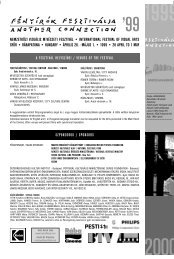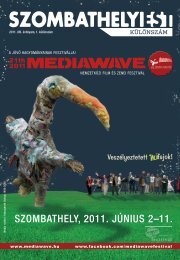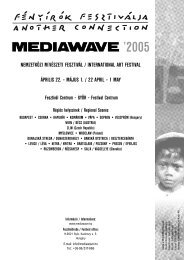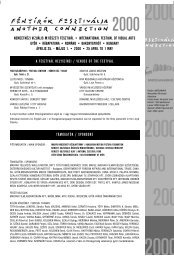Katalógus 2003 - Mediawave
Katalógus 2003 - Mediawave
Katalógus 2003 - Mediawave
You also want an ePaper? Increase the reach of your titles
YUMPU automatically turns print PDFs into web optimized ePapers that Google loves.
JANE BUNNETT & THE SPIRITS<br />
OF HAVANA (CND/CUBA)<br />
www.janebunnett.com<br />
Jane BUNNETT – szaxofon, fuvola / saxophone, flute, corneta china,<br />
Lawrence CRAMER – trombita, szárnykürt / trumpet, flugelhorn, David<br />
VIRELLES – zongora / piano, Jesus DIAZ – ének, ütohangszerek / vocals,<br />
percussion, Fransisco MELA – dob / drums, Petar SLAVOV – bogo / bass<br />
A Kanadai Nagykövetség támogatásával!<br />
Jane Bunett Torontóban született és nõtt fel. Klasszikus képzést kapott, mint fuvolás és<br />
szaxofonos, de elkezdett jazz iránt is érdeklõdni, miután látta Charles Mingust és Rahsaan<br />
Roland Kirket játszani. E felismerést hosszú tanulóidõ követte, olyan emberek közrem<br />
ködésével, mint Steve Lacy, Don Pullen és az énekesnõ Sheila Jordan. Zenéje dinamikus<br />
egyvelege a jazznek, a vallásos zenéknek és a pergõ dobtémáknak – Kuba sokrét<br />
zenei világának hódolva. Rajongása a sziget iránt jóval megelõzte az utóbbi évek divatját,<br />
mert közel 20 éve rendszeresen keresi a kapcsolatot az ottani zenei körökkel. Elmondása<br />
szerint az a legnagyszer bb a zenében, hogy olyan emberekkel tud általa bensõséges<br />
kapcsolatba kerülni a világ bármely részén, akikkel egyébként máshogy nem tudna<br />
kommunikálni. Mély barátsága, mely a közben már elhunyt kubai énekesnõhöz, Merceditas Valdes-hez f zõdött, örök nyomot hagyott benne, „mágikus<br />
egyéniségétõl” kapta ajándékba a kubai zenét, hidat alkotva két kultúra között, létrehozhatta a jazz talán legvidámabb dallamait.<br />
Born and raised in Toronto, the classically trained flutist/saxophonist Jane Bunnett became interested in pursuing a career as a jazz musician<br />
after seeing Charles Mingus and Rahsaan Roland Kirk perform. Apprenticeships followed with Steve Lacy, Barry Harris, Don Pullen, Dewey<br />
Redman, Billy Hart and vocalist Sheila Jordan to name a few. Hailed as one of the finest artists working in modern jazz, soprano sax player<br />
and flautist Jane Bunnett has earned a reputation as a brave musical explorer. Bunnett realizes a longstanding dream of showcasing the diversity<br />
of Cuba’s rich musical legacy. A legacy that she has shared with the country for nearly 20 years. The greatest thing about being a musician<br />
Bunnett says, „is that you get to travel places and quickly establish a rapport with people with whom you might not be able to communicate<br />
in any other way.” Bunnett’s friend the singer Merceditas Valdes, with whom Bunnett performed and recorded albums such as<br />
Chamalongo, died in 1996. „She took my hand and introduced me to the music.” Says Bunnett,<br />
of the legendary performer. „She had a magical quality.” So, too, does Bunnett. As Spirits of Havana<br />
makes clear, Jane Bunnett bridges two cultures while creating some of the most joyful<br />
sounds in jazz. In matters pertaining to Jane Bunnett one should expect the unexpected.<br />
TARA FUKI (CZE)<br />
www.tarafuki.cz<br />
Dorota BLAHUTOVÁ és/and Andrea KONSTANKIEWICZ –<br />
cselló, ének / violincello, vocals<br />
IMPROVIZÁLT ZENE / IMPROVISED MUSIC<br />
Az ostravai (Észak-Morvaország) konzervatóriumba járt mindkét energikus<br />
csellista-lány, azonban csak 1999-ben találkoztak brnoi zenei és<br />
filozófiai tanulmányaik során. Andrea (1972) ez idõ tájt éppen a BOO<br />
nev zenekarban, és a Rale nev nemzetközi zenés-tánc formációban<br />
tevékenykedett, míg Dorota (1975) a brnoi Lippany nev alternatív<br />
zenekarban játszott. Mindketten szerettek volna akusztikusan is játszani,<br />
így találtak egymásra, s hamar kiderült, hogy Dorotának a hangja<br />
sem akármilyen. Zenéjüket és szövegeiket az éjszaka költészetének<br />
nevezhetjük, valamint az álmaik – vagy ahogy õk mondják – a tudatalattijuk<br />
extrakciói ihletik, melyek gyakran sokkal igazibb képet adnak a valóságról, mint amit napközben érzékelnek. Ahogy az álmaik, úgy a<br />
zenéjük is képes a lágy, elringató gyengédségre, de hirtelen brutalitással fájdalmat is tud okozni. Szövegeiket lengyelül éneklik, ezzel egyrészt<br />
utalva lengyel eredetükre, másrészt a lengyel nyelv jó énekelhetõségét kihasználva, jobban ki tudja bontakoztatni hangját Dorota. Zenei stílusuk<br />
annyira egyedi, hogy bármiféle besorolás eredménytelen lenne, de gyakorlatilag minden ember, aki mer álmodni, fog mondanivalót találni<br />
magának zenéjükben.<br />
Both of these two energetic violoncellists come from Northern Moravia, where they were passing by each other while studying at the Ostrava<br />
Conservatory. They met one year ago in Brno during their musicology studies at the Philosophical Faculty. Andrea (born in 1972) was at that<br />
time featured in the band BOO and in the international music-dance formation Rale, while Dorota (born in 1975) was playing with the Brno-based<br />
alternative band Lippany. They were both willing to play in an acoustic structure; moreover it appeared soon that Dorota had a beautiful voice.<br />
In their music and texts, they get inspired by the poetry of the night and by the dreams, which they consider as extractions from the sub-conscious.<br />
„It is because what happens to us during the night is totally different and sometimes even truer than what we perceive in the day,” says<br />
Andrea. Just like dreams, their music is able to gently caress and soothe, but also to hurt with its brutal urgency. Their texts are written in Polish,<br />
which, as they unanimously agree, they have flowing in their veins. Dorota’s mother is Polish and the great-great-great-grandmother of Andrea<br />
was a Polish countess. Moreover, „the Polish language is far more fit for singing because it has softer consonants and vowels than the Czech<br />
language. I think that in that language my voice even has another coloration…” says Dorota. Their own musical style is so original that it escapes<br />
all possible classification, but it rather surely pines for communication with the receptive and open listener who is not afraid to dream.<br />
7







